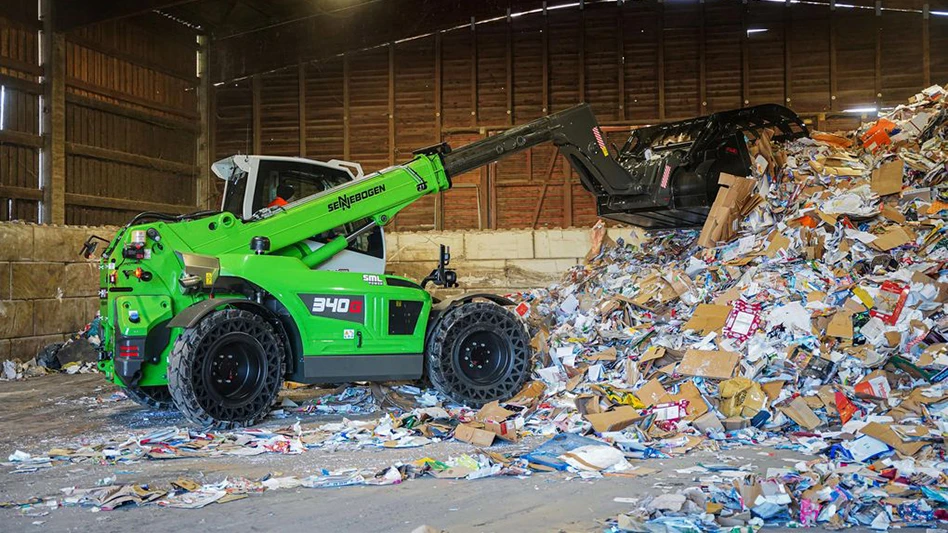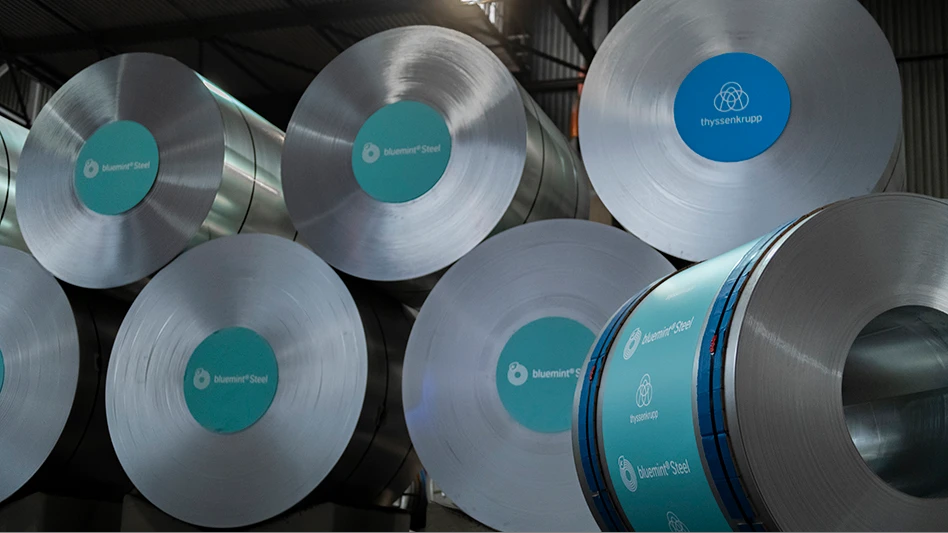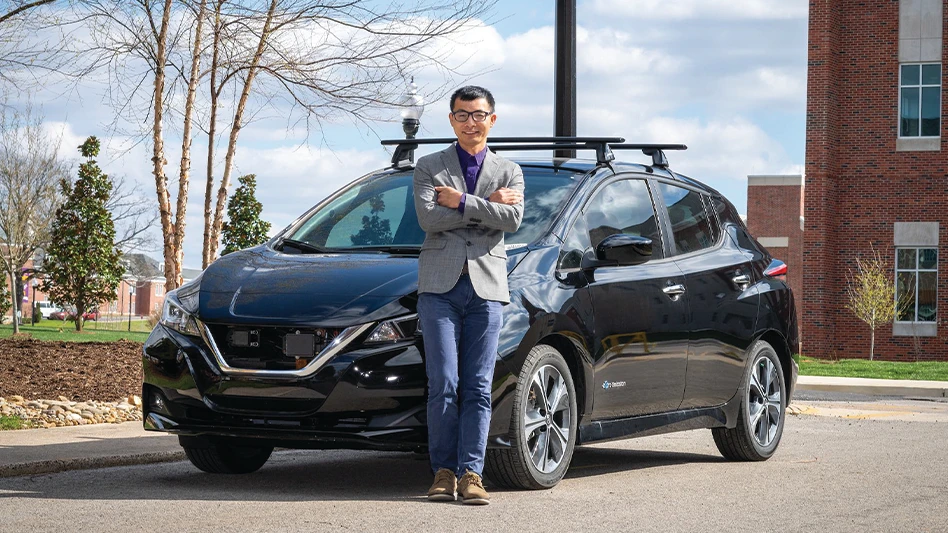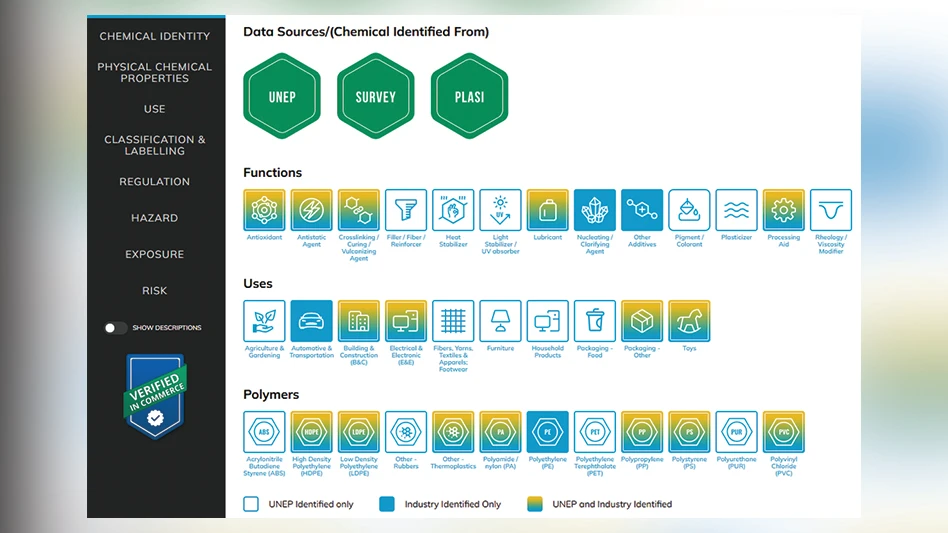 John McShane, general manager electronics recycling, left, and Tom Riek, vice president of recycling, Veolia ES North America, are finding a niche in the locations they serve and the materials they process to meet their customers’ needs. (Photo by Neil Kiekhoffer, Front Room Image) John McShane, general manager electronics recycling, left, and Tom Riek, vice president of recycling, Veolia ES North America, are finding a niche in the locations they serve and the materials they process to meet their customers’ needs. (Photo by Neil Kiekhoffer, Front Room Image) |
Veolia Environmental Services (VES) is part of Veolia Environnement's global family of companies and one of the largest worldwide providers of waste services. VES has operations in 31 countries, employs an estimated 84,800 people and recycles 7.6 million tons of material per year. Its North American business division, Veolia Environmental Services North America (VESNA) has been making the global company a household name in the United States and Canada through its strategic acquisitions and its commitment to offering its customers alternative options to landfilling material.
As the fifth largest waste services provider in North America, VESNA is making inroads by growing in unlikely places, both through the locations it serves and the types of material it handles.
Beyond traditional household recycling, VESNA, through its three North American divisions—Veolia ES Solid Waste Inc., Veolia ES Technical Solutions L.L.C. and Veolia ES Industrial Services Inc.—gives commercial and household customers landfill diversion options for their many waste streams, including lighting, electronics and chemicals.
Turning "Waste" into a Resource
Tom Riek joined the solid waste division of VESNA in November 2010 as vice president of recycling. Having spent time working for other solid waste and recycling companies throughout his career, Riek says he saw a strong foundation with VESNA—a foundation that he wants to build on. "There is an opportunity for something bigger here," says Riek, who oversees the traditional recycling operations at Veolia ES Solid Waste, which includes cardboard, paper and container recycling. "We are really in our infancy. There is tremendous opportunity to expand Veolia's capabilities from a processing and sales standpoint."
Riek says the "greening" of the world has made the recycling industry "very robust and exciting to be in."
 Expanding Veolia's service offering is a priority for Riek, which to him means giving customers what they want. "Our customers every day ask for different alternatives to the landfill, and our job is to provide the service our customers are requesting.
Expanding Veolia's service offering is a priority for Riek, which to him means giving customers what they want. "Our customers every day ask for different alternatives to the landfill, and our job is to provide the service our customers are requesting.
"The vision is to expand our service offering in a variety of ways," he continues. "We have built recycling processing assets, we will acquire some recycling processes and we will partner with people who already own their recycling assets to help us provide those services to our customers," Riek adds.
Veolia's tagline is "Turning Waste into a Resource," and Riek says Veolia embodies that phrase. "Everyone in this company really believes in that tagline and really works toward that goal." The company's customers drive that slogan and challenge Veolia to find new ways to minimize waste production and maximize re-use, he adds.
Veolia's worldwide scale in the environmental services arena makes a vast array of resources available to Riek. The company has strong market share in Europe, Australia and the Asia Pacific. "We have tremendous assets we can draw upon to help us provide solutions."
Riek has observed that Europe has advanced its processing of recyclables because it has been driven by the economic and regulatory climate there.
Veolia's strategy for growth in North America has not been to compete with the large, established companies, but to find smaller areas of opportunity.
"We're not everywhere or in a lot of the large cities," Riek explains. "We're in Columbus, Ga. We're in Lexington, Ky. We're in Evansville, Ind. These are markets that don't generate the volumes of recyclables to justify a $20 million investment in a single-stream MRF (material recovery facility)."
 Riek adds, "The challenge for us is to figure out how to do it somewhat on a smaller scale and do it economically on a smaller scale"
Riek adds, "The challenge for us is to figure out how to do it somewhat on a smaller scale and do it economically on a smaller scale"
One of the challenges Riek faces in the U.S. that his counterparts in Europe do not is how to make technologies like anaerobic digestion feasible. In Europe, where landfill tipping fees are more than $100 per ton, using technologies and advanced processes to handle discarded material offers economic benefit. European countries also often receive funding from regulatory agencies to assist them. Riek is tasked with figuring out how to advance technology and waste diversion in the U.S. "It is the right question to ask, and the challenge for us is how to do it economically in the absence of subsidies or in the absence of these laws and regulations that drive that in Europe."
Veolia brings together its internal experts from throughout the world to share ideas and answer those types of questions through a program it has developed called The Centers of Excellence. "Our recycling programs are different across the country, and when you add in the world, they are even more different," Riek says. "It is just one example of what we are doing as a company to knowledge share."
Veolia handles residential, commercial and industrial recycling in North America. Riek emphasizes that the company does more than collect paper, plastics, metals and glass. It has the equipment to break down these materials. The company also is involved in C&D (construction and demolition) recycling, organics recycling and in reclaiming used oils from an oil refinery in Quebec City. "It is a wide variety of not only your standard household items but also those items that contain hazardous constituents, such as batteries, light bulbs and electronics," Riek says.
Lighting and Electronics
VESNA's core lighting and electronics recycling business focuses on recycling fluorescent lamps, ballast, batteries, electronics and mercury, says John McShane, general manager of the electronics recycling group within Veolia ES Technical Solutions.
The division was formed through six acquisitions made around the time McShane joined the division in 2002. "We put together a national footprint of processing facilities to provide recycling services that are convenient to a broad range of commercial and industrial customers," McShane explains.
Since then the business has grown substantially. In 2010, Veolia recycled enough linear florescent lamps that, if they were laid end to end, they would stretch some 28,000 miles, the equivalent of traveling from New York to Los Angeles 10 times, McShane says.
 Veolia ES Technical Solutions has four recycling locations for processing lighting and electronics—Phoenix; Tallahassee, Fla.; Stoughton, Mass.; and Port Washington, Wis.—all of which process lighting into various components for further recycling. Veolia also operates several collection locations throughout the country that feed the recycling plants.
Veolia ES Technical Solutions has four recycling locations for processing lighting and electronics—Phoenix; Tallahassee, Fla.; Stoughton, Mass.; and Port Washington, Wis.—all of which process lighting into various components for further recycling. Veolia also operates several collection locations throughout the country that feed the recycling plants.
Although there are variations between the equipment used at each facility, all lamp recycling operations use a dry separation process. Each machine is capable of processing 20,000 to 40,000 4-foot lamps per 8-hour shift with an asset recovery rate of approximately 100 percent, the company says. Of total bulb weight, roughly 96 percent is recovered as glass, 2 percent as aluminum, less than 2 percent as phosphor powder and less than 1 percent as mercury. Beyond recycling the aluminum end caps and glass, Veolia ES Technical Solutions recycles the mercury contained within the phosphor powder.
The aluminum end caps are sent for metals recycling, and the glass can be used for a variety of different applications, including fiberglass or as an aggregate in asphalt. The mercury-contaminated phosphor powder is collected and is further processed in Veolia's retorts. The mercury from the phosphor powder volatilizes in the retort oven under high temperature, and the vapor is captured and condensed or cooled back down into elemental mercury.
"We will use our retorts for all sorts of items that contain mercury," McShane says. Such items include old thermostats and old mercury switches that are removed from vehicles before they go through a shredder.
"We recover between 15 and 20 metric tons of mercury on an annual basis," McShane estimates. "The main impetus behind our industry is for people to do the right thing and to work to reclaim mercury wherever we can so it doesn't get into our environment."
Medical equipment is another specialty area Veolia is focusing on. Pharmaceutical companies and manufactures of medical equipment have come to Veolia because their products contain biological or hazardous contaminants that other electronics recyclers are not equipped to handle at their facilities.
McShane says, "One of our goals at Veolia is to deliver preferred solutions. I am most proud that we have been able to come up with some very unique recycling processes while still being protective of our employees' health and safety. We have built a specialized disassembly room with an isolated air handling system, provided our staff with a supplied breathing air system and have conducted additional medical screenings and industrial hygiene monitoring."
McShane recounts a customer that came to Veolia with medical devices that contained an anesthetic agent. "The question is what do you do when the equipment cannot be managed using standard waste management procedures and you can't send it into the traditional electronics recyclers," McShane says. "Essentially they had trailer loads full of these devices," he recalls.
 Veolia’s equipment can process 20,000 to 40,000 fluorescent lamps per 8-hour shift. Veolia’s equipment can process 20,000 to 40,000 fluorescent lamps per 8-hour shift. |
Veolia was able to recycle 410 tons of material that otherwise would not have been recycled.
"We are also seeing the demand for other medical devices and meters," McShane adds. "This stuff needs to be handled with a degree of care that your traditional electronics recycler is not set up to do."
Veolia's RecyclePak® program is another of the company's innovative approaches to lighting and electronic scrap recycling, McShane says. RecyclePak is a pre-paid recycling service for commercial, industrial and residential customers who want to recycle fluorescent lamps, ballast, batteries, electronics and mercury waste. RecyclePaks can be ordered online at www.prepaidrecycling.com, and the price includes everything needed to recycle these items, including the packaging, return shipping, processing and documentation.
McShane says lighting and electrical distributors have been integral to the program. "The same companies that are selling new fluorescent lamps that contain mercury are selling a recycling solution to their customers," he explains. "It just makes sense to help close the loop.
"Over the past 10 years, we've expanded the program from six containers to 26 and expect to continue to broaden the types of packages we offer as well as the materials accepted in the program and make it easier for someone to recycle with us," he says of RecyclePak.
Veolia ES Technical Solutions plans to continue to grow its lighting and electronics recycling services. "We are always looking for new products, services and acquisitions that make good strategic sense for us," McShane says. "We do think there is a lot of room for innovation in the recycling industry."
Solvent Recovery
VESNA also is finding a recycling niche in its solvent recovery program. Ted Zajack, director of reclaim operations, says solvent recovery involves taking those materials that may not be suitable or past their useful lives for a particular user and getting further use out of them.
Veolia gives solvents a second life in three ways. The first way is direct re-use. This is where a material is still clean enough that another user can use it directly without processing. It is taken from the generator of the material and given to a consuming customer.
The second way Veolia recovers solvents is by toll processing. This is where waste or spent material from a generator is recycled to that generator's raw material specification. The material is then given back to that same generator for re-use.
Veolia also accepts solvents from generators who do not want the recycled product. In such instances, Veolia recycles the solvents to a specification that is acceptable to another user, who then purchases the recycled product from Veolia.
For companies who have a large stream of solvents, Veolia can build and operate a facility on site to provide recovery and re-use. "We have the ability to do that because we do it for ourselves all the time," Zajack says. "We modify our own facilities in order to process streams for different generators."
Solvent recovery is one area where Veolia is making considerable investments. "We are very committed to it. Generators are very interested in recycling their waste," Zajack says.
Veolia uses two techniques for solvent recovery. The first process is what Zajack describes as distillation. This is where a liquid is turned into a vapor or a gas and then condensed. With used paint thinner, for example, pigments left after the distillation process, which are disposed of, and the distilled solvent product can be re-used.
 The other process the company uses is fractional distillation. In this process, materials are put through distillation towers and separated by virtue of their boiling points.
The other process the company uses is fractional distillation. In this process, materials are put through distillation towers and separated by virtue of their boiling points.
Veolia has four facilities that handle solvents for recovery. They are located in Azusa, Calif.; Henderson, Colo.; Middlesex, N.J.; and West Carrolton, Ohio.
Veolia's emphasis on "turning waste into a resource" can be seen in how the company approaches solvent recovery.
Zajack says of these materials, "If they are not recovered or re-used, they are going to be incinerated. We get no value out of it. Once it is incinerated, it is gone."
The author is associate editor of Recycling Today and can be reached at ksmith@gie.net.

Explore the November 2011 Issue
Check out more from this issue and find your next story to read.
Latest from Recycling Today
- Harsco brands slag-content asphalt as SteelPhalt
- ArcelorMittal puts French EAF conversions on hold
- Associations ask for effective EPR to drive textile circularity in Europe
- GESA report claims 72 countries recycled EPS in 2023
- Report: Saica exploring recycled paper mill project in Dayton, Ohio
- Hydro’s Alumetal to meet 15 percent of its energy demands through solar
- CSA Group publishes standard defining plastics recycling in Canada
- Second Cyclyx Circularity Center to be located near Fort Worth, Texas





